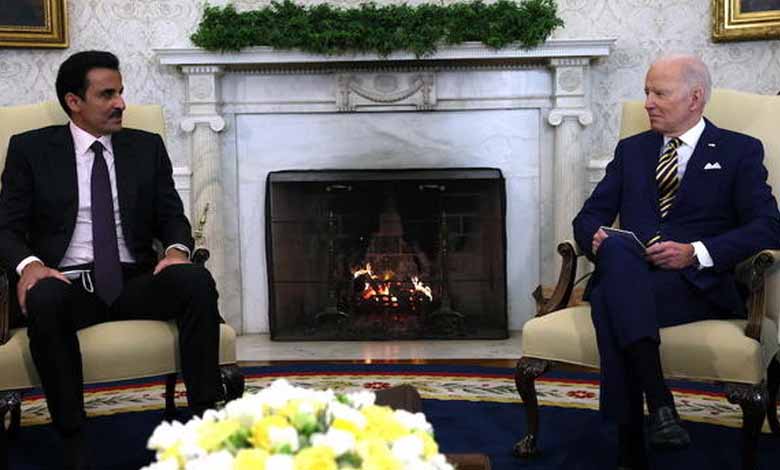The duality of Qatar, the enemy and the ally at the same time
Since its establishment, Qatar has been considered an emirate that sponsors and finances terrorism

Last March, the US Administration designated the State of Qatar as a major non-NATO ally, a distinction that Israel bears, but the strange thing about Qatar is that it is an ally of the United States, an ally of Iran, and a global headquarters for the Muslim Brotherhood. How did it get these opponents together?
To dispel confusion in the answer to the question, we need to go back in time to 1996. That year, the Qatari regime took two major initiatives: first, the establishment of the Al-Jazeera Space Network, then the opening of the Al-Udeid Air Base, and giving it to the United States Air Force to use as a central command responsible for directing all United States air operations in the Middle East and South Asia.
It was the beginning of Qatari duplication, to be generous with the United States in donations and gifts, and to do whatever it wishes in supporting and promoting terrorism.
Since the inception of the Qatari Al-Jazeera, it has been the strongest voice in history of the Muslim Brotherhood and worked to spread its message in global jihad. It has also served as the main network of Al-Qaeda before and after the September 11 attacks, and also as the prime media reference for Hamas, ISIS and other terrorist groups. In addition to all of this, it has been a fierce defender of Iran, the most recent example being its lack of coverage of the mass anti-Iranian regime protests taking place inside Iran these days.
Observers say that if it were not for Al-Jazeera, the forces of terrorism would not have spread over the past 25 years.
Al-Jazeera is not an independent actor, but rather a platform controlled by the Qatari regime, whose Islamic and foreign policies coincide with the channel’s editorial line. Qatar is the international headquarters of Hamas and its biggest financier. It was the base of operations of the Taliban leadership during their 20-year war against America and a sanctuary for terrorists and financiers of Al-Qaeda before and after September 11.
The relationship between the Brotherhood and Qatar dates back to the 1960s, when the tiny emirate brought the Egyptian Brotherhood’s Youssef Qaradawi to Doha after Egyptian President Gamal Abdel Nasser expelled him from Egypt in order to establish an Islamic education program that would become the ideology of the state.
Qaradawi received the highest pay ever from Al-Jazeera Media Network for spreading his message of terrorism to the entire Arab world, and for decades, his program “Sharia and Life” was watched by tens of millions of Muslims around the world.
David Riboi, author of “Qatar’s Shadow War”, explains that “given the intimate relationship of the Qatari state and its ideological outreach to the Brotherhood, it has become extremely difficult to see where one ends and the other begins”.
In other words, Qatar is, in essence, almost from its inception, an emirate that sponsors and finances terrorism.
Despite spreading the message of global terrorism and supporting terrorist groups around the world as well as Iran, the Qataris have not spared the Americans, building a modern base at their own expense (Al Udeid Base) at a time when tensions between Saudi Arabia and the United States have escalated and many other valuable gifts to the U.S. armed forces, private sector and U.S. elites have followed in all walks of life.
On the other hand, Doha plays a pivotal role in launching terrorist attacks against the United States and the free world, and at the same time rains them with gifts. Qatar has opened the campus of American universities and think tanks in Doha and opened factories that employ thousands of American workers in key states. It also regularly invites influential community and intellectual leaders to conduct expensive luxury tours in Doha and spends millions on lobbyists in Washington.
During the George W. Bush administration, U.S. reliance on the Qatar regime’s many bases saved the country from criticism and sanctions after the September 11 attacks and during the wars in Iraq and Afghanistan.
During the Obama administration, relations reached new heights as Barack Obama and his advisors worked to reorganize U.S. relations with the Muslim Brotherhood and Iran and distance themselves from traditional U.S. allies such as Egypt and Saudi Arabia.
In 2017, the Trump administration had a golden opportunity to sever ties with Qatar in 2017, when Saudi Arabia, Egypt, the United Arab Emirates, and Bahrain severed ties over its support for terrorism. But instead of standing alongside their allies, the Trump administration first sat on the sidelines and later mediated a peace deal between the parties, and the Biden administration is currently working to expand U.S.-Qatar relations.



